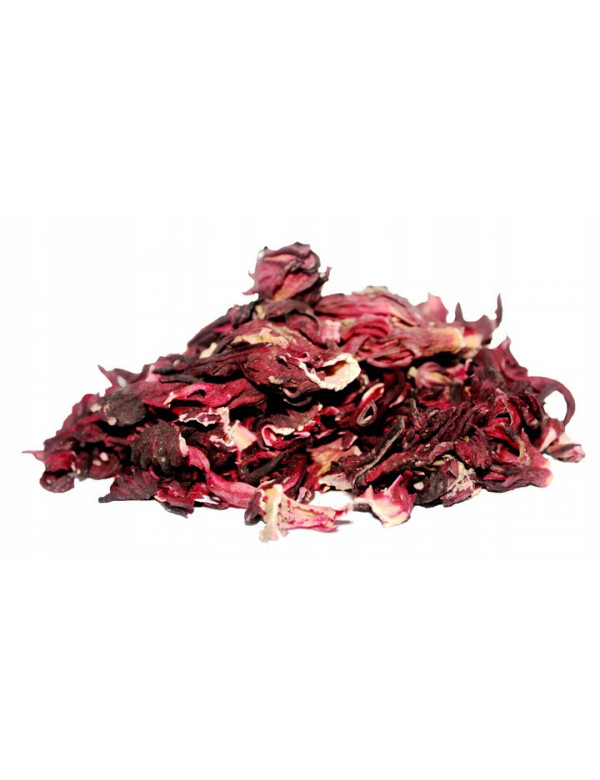



Hibiscus tea has anti-inflammatory, antiseptic and diuretic properties, it is characterized by a high content of vitamins, natural acids and minerals. Supports metabolism, has a detoxifying effect, and prevents the accumulation of water in the body.
Hibiscus tea is said to lower systolic and diastolic blood pressure, reduce bad cholesterol levels and actually increase the good cholesterol levels. It also contains polyphenols, which have been shown to have anti-cancer properties.
Can be enjoyed cold or hot.
How to prepare:
quantity: 1/4 cup of dried hibiscus per cup
temperature: 100 C
brewing time: 5 to 7 minutes
Multiple infusion: no
Food pairing: sweet, fruity or herbal flavor. Try it with brie, green apple and ham sandwich
Tip: Do not use while pregnant or breastfeeding

Security policy

Delivery policy
Health Benefits of Hibiscus Tea
While hibiscus tea may not contain many vitamins or minerals, it does contain vitamin C and other antioxidants. Current research shows that the herbal tea may provide many health benefits:
Lower Blood Pressure
High blood pressure increases your risk of heart disease. Some studies show that drinking hibiscus tea may help reduce systolic blood pressure levels compared to a placebo.
Other studies show that it may help to reduce both systolic and diastolic blood pressure.
Reduce Cholesterol Levels
Some studies show that hibiscus tea may reduce cholesterol levels — another risk factor of heart disease. In one study, people who drank hibiscus tea experienced an increase in “good cholesterol” (high-density lipoproteins) and a decrease in “bad cholesterol” (low-density lipoproteins). Many of the current studies have been limited to individuals with certain conditions, however, and some show conflicting results.
Improve Liver Health
Hibiscus tea may help to improve liver health. A study using hamsters showed that hibiscus tea may help decrease markers of liver damage.
One study with human participants showed that hibiscus extract may improve liver steatosis, which could reduce the risk of liver failure.
Cancer Prevention
Along with anthocyanins, hibiscus tea also contains another antioxidant called polyphenols, which have been shown to have anti-cancer properties. Much of the current research involves test-tube studies.
One study showed that hibiscus extract limits cell growth and reduces the invasiveness of mouth cancer.
Other test-tube studies show that hibiscus tea may help prevent the spread of prostate cancer cells and stomach cancer cells.
Antibacterial Properties
Hibiscus tea may provide antibacterial properties. Again, the current research is limited to test-tube studies. One showed that hibiscus extract inhibits E. coli.
It may also be just as effective as some medications at fighting many different bacteria strains.
Promote Weight Loss
Several studies show the potential of hibiscus tea to promote weight loss and prevent obesity. One study showed that hibiscus extract reduced body weight, body fat, and body mass index after 12 weeks.
Potential Risks of Hibiscus Tea
While hibiscus tea may provide health benefits, it may also present some risks. These risks include:
Hibiscus and Mallow Allergies
If you’re allergic or sensitive to hibiscus flowers (or other plants in the mallow family), you should avoid drinking hibiscus tea.
Medication Interactions
Hibiscus tea may interact with certain medications. It can decrease the effectiveness of the malaria drug chloroquine. If you take medications for high blood pressure or diabetes, it can cause a significant drop in blood pressure. The plant also contains phytoestrogens (or plant estrogens) that may decrease the effectiveness of birth control medication.
Pregnancy Concerns
The phytoestrogens in hibiscus tea may cause complications during pregnancy. For instance, they may trigger preterm labor. If you are pregnant or breastfeeding, you may want to avoid hibiscus tea or look for an alternative.